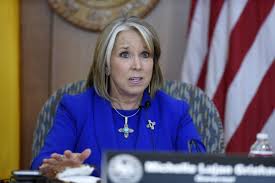
Oil and gas groups led by the American Petroleum Institute say some states will be devastated if a ban on federal leasing and public lands were to take effect.
As part of his energy plan, Democratic presidential nominee Joe Biden has vowed to push for an end to new oil and gas drilling leases on federal land to combat climate change.
Industry groups in Wyoming and New Mexico say a new analysis warns of negative consequences for both states.
New Mexico would lose an estimated 62,000 jobs because of an expected slide in oil and gas production and the state could face a revenue loss of nearly $1.1 billion.
The job loss in Wyoming would be an estimated 33,000 jobs and a decline of $640 million in state federal revenue sharing. Wyoming accounts for 38% of federal onshore natural gas production and 16% of oil production.
If enacted, such a policy would have a big impact on New Mexico, where federal land makes up about 32% of the state, according to the report to be released by the American Petroleum Institute and the New Mexico Oil and Gas Association.
More than half of New Mexico’s oil production and nearly 67% of its natural gas production in 2017 occurred on federal lands, the report found.
“There is no state that would be hurt more by a ban on development on federal lands than New Mexico,” API President and CEO Mike Sommers said in an interview.

“Banning federal leasing and development on federal lands and waters would derail decades of U.S. energy progress and return us to the days of relying on foreign energy sources hostile to American interests,” Sommers said.
“Given that nearly 50 percent of all lands in Wyoming are owned by the federal government, a ban on federal leasing and development would decimate the natural gas and oil industry and Wyoming’s economy along with it,” Petroleum Association of Wyoming President Pete Obermueller said. “This policy would damage both national security and environmental stewardship while devastating Wyoming’s middle class, local communities and public school system.”
The analysis, prepared by OnLocation and commissioned by API, used the same software the U.S. Energy Information Administration (EIA) uses to produce its Annual Energy Outlook. Key projections include:
- America’s energy security would be at risk:
- By 2030, offshore production for natural gas would decrease by 68 percent and for oil by 44 percent.
- U.S. oil imports from foreign sources would increase by 2 million barrels a day.
- Through 2030, the U.S. would spend $500 billion more on energy from foreign suppliers.
- The U.S. economy would take a hit:
- U.S. GDP would decline by a cumulative $700 billion through 2030.
- Over $9 billion in government revenue, including funding for state education and conservation programs, would be at risk.
- Nearly one million jobs would be lost by 2022, with top production-states suffering significant losses.
Despite the ominous projection from the study about the harmful effect on New Mexico, the state’s Democrat Gov. Michelle Lujan Grisham has endorsed Biden and said this week it’s premature to say whether her state would seek a waiver from such a federal land management policy shift.

“If we are fortunate enough to have a President Biden, the governor knows that will require a close working relationship to both protect our environment and rebuild our state’s economy, and we look forward to those discussions and that work,” Lujan Grisham spokeswoman Nora Meyers Sackett said.
Before a drilling slowdown this year, surging oil production in southeastern New Mexico had made the state the nation’s third-highest oil producer – behind Texas and North Dakota.
New Mexico Oil and Gas Association Executive Director Ryan Flynn said restricting oil and gas development on federal lands would lead to less funding being available for New Mexico public schools, which rely on annual distributions from a state permanent fund.
“New Mexico has enjoyed economic success in recent years because of investments and responsible development on federally managed lands, but changing course now will only ensure that jobs and capital stops at our state border,” Flynn said in a statement.
Click here for API report.
Source: Albuquerque Journal/American Petroleum Institute






